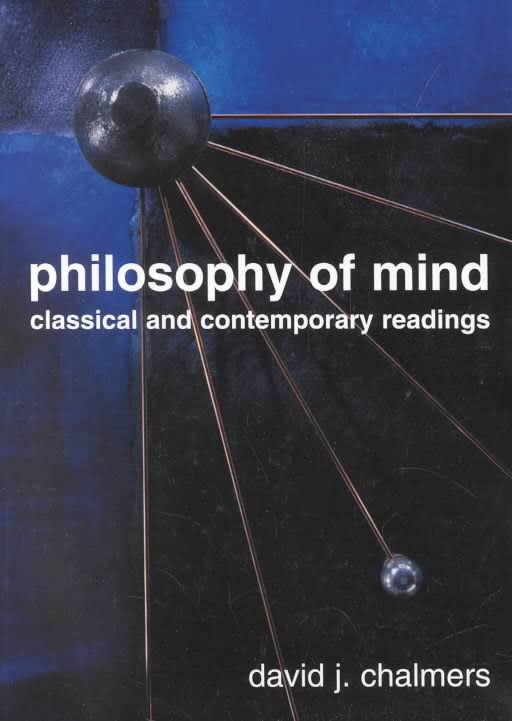philosophy of mind: classical and contemporary readings
Edited by David J. Chalmers

My anthology of articles in the philosophy of mind, Philosophy of Mind: Classical and Contemporary Readings was published by Oxford University Press in 2002. This is a comprehensive collection that can be used in university courses at all levels (introductory, advanced undergraduate, graduate). The volume concentrates on foundational issues about the metaphysics of mind, consciousness, and mental content. The book is about 680 pages long.
A second edition is coming soon!
The table of contents for the volume is below.
The current list of mistakes is here.
TABLE OF CONTENTS
Preface
PART I: FOUNDATIONS
Introduction
A. Dualism
1. Rene Descartes, Meditations on First Philosophy (II and VI).
2. Rene Descartes, Passions of the soul (excerpt).
3. Thomas H. Huxley, On the hypothesis that animals are automata, and its history (excerpt).
4. Raymond M. Smullyan, An unfortunate dualist.
B. Behaviorism
5. Gilbert Ryle, Descartes’ myth.
6. Rudolf Carnap, Psychology in physical language (excerpt).
7. Hilary Putnam, Brains and behavior.
C. The identity theory
8. U.T. Place, Is consciousness a brain process?
9. J. J. C. Smart, Sensations and brain processes.
10. Herbert Feigl, The “mental” and the “physical” (excerpt).
D. Functionalism
11. Hilary Putnam, The nature of mental states.
12. David M. Armstrong, The causal theory of the mind.
13. David Lewis, Psychophysical and theoretical identifications.
14. Ned Block, Troubles with functionalism (excerpt).
15. Martine Nida-Rümelin, Pseudonormal vision: An actual case of qualia inversion?
E. Other psychophysical relations
16. C. D. Broad, Mechanism and its alternatives (excerpt).
17. Donald Davidson, Mental events.
18. Jerry A. Fodor, Special sciences.
19. Jaegwon Kim, Multiple realization and the metaphysics of reduction.
20. Terence Horgan, From supervenience to superdupervenience: Meeting the demands of a material world (excerpt).
21. Frank Jackson, Finding the mind in the natural world.
F. Mental causation
22. Jaegwon Kim, The many problems of mental causation (excerpt).
23. Stephen Yablo, Mental causation.
PART II. CONSCIOUSNESS
Introduction
A. General
24. Ned Block, Concepts of consciousness.
25. Thomas Nagel, What is it like to be a bat
26. Daniel C. Dennett, Quining qualia.
27. David J. Chalmers, Consciousness and its place in nature.
B. The knowledge argument
28. Frank Jackson, Epiphenomenal qualia.
29. David Lewis, What experience teaches.
30. Brian Loar, Phenomenal states (second version).
31. Daniel Stoljar, Two conceptions of the physical.
C. Modal arguments
32. Saul A. Kripke, Naming and necessity (excerpt).
33. Christopher S. Hill, Imaginability, conceivability, possibility, and the mind-body problem (excerpt).
34. Grover Maxwell, Rigid designators and mind-brain identity (excerpt).
D. The explanatory gap
35. Joseph Levine, Materialism and qualia: The explanatory gap.
36. Paul M. Churchland, The rediscovery of light.
37. Ned Block and Robert Stalnaker, Conceptual analysis, dualism, and the explanatory gap.
38. Colin McGinn, Can we solve the mind-body problem?
E. Higher-order thought and representationalism
39. David Rosenthal, Explaining consciousness.
40. Fred Dretske, Conscious experience.
41. Christopher Peacocke, Sensation and the content of experience: A distinction.
42. Michael Tye, Visual qualia and visual content revisited.
43. Sydney Shoemaker, Introspection and phenomenal character.
PART III. CONTENT
Introduction
A. The nature of intentionality
44. Franz Brentano, Mental and physical phenomena (excerpt).
45. Roderick M. Chisholm, “Intentional inexistence”.
46. Fred Dretske, A recipe for thought.
47. Ruth Millikan, Biosemantics.
48. Robert M. Brandom, Reasoning and representing.
49. Terence Horgan & John M. Tienson, The intentionality of phenomenology and the phenomenology of intentionality.
B. Propositional attitudes
50. Wilfrid Sellars, Empiricism and the philosophy of mind (excerpt).
51. Jerry A. Fodor, Propositional attitudes.
52. Daniel C. Dennett, True believers: The intentional strategy and why it works.
53. Paul M. Churchland, Eliminative materialism and the propositional attitudes.
C. Internalism and externalism
54. Hilary Putnam, The meaning of “meaning” (excerpt).
55. Tyler Burge, Individualism and the mental (excerpt).
56. David J. Chalmers, The components of content (revised version).
57. Michael McKinsey, Anti-individualism and privileged access.
58. Anthony Brueckner, What an anti-individualist knows a priori.
59. Andy Clark & David J. Chalmers, The extended mind.
PART IV: MISCELLANEOUS
Introduction
60. Derek Parfit, Reductionism and personal identity.
61. A. J. Ayer, Freedom and necessity.
62. Bertrand Russell, Analogy.
63. John R. Searle, Can computers think?